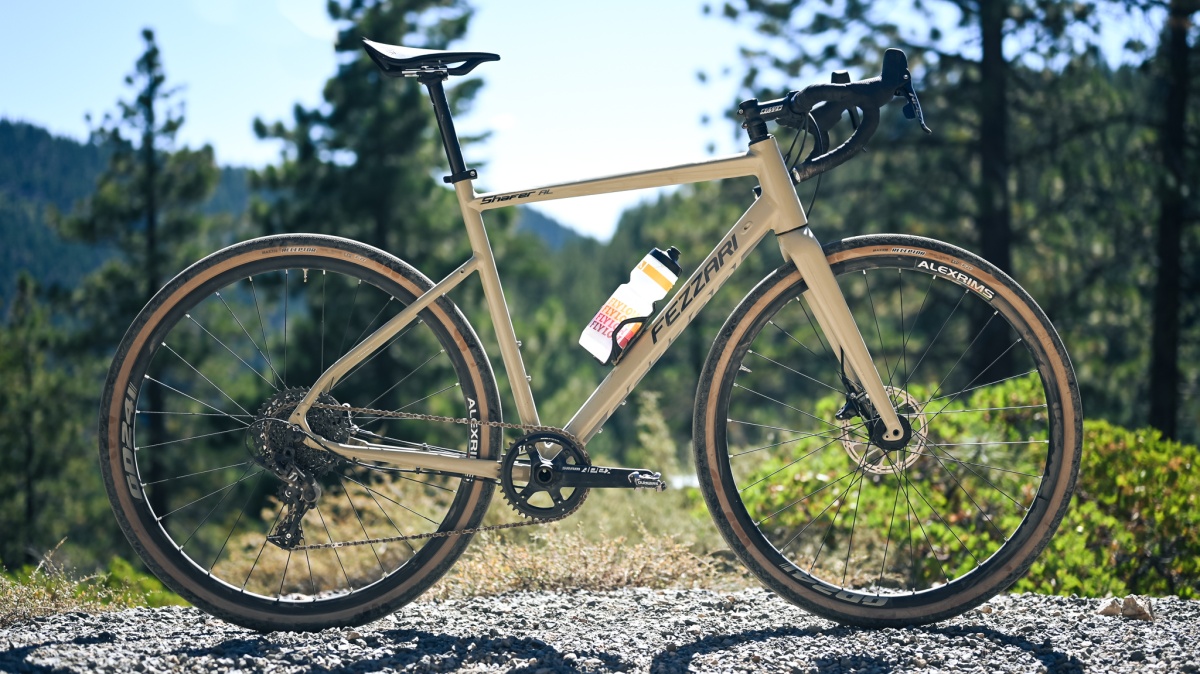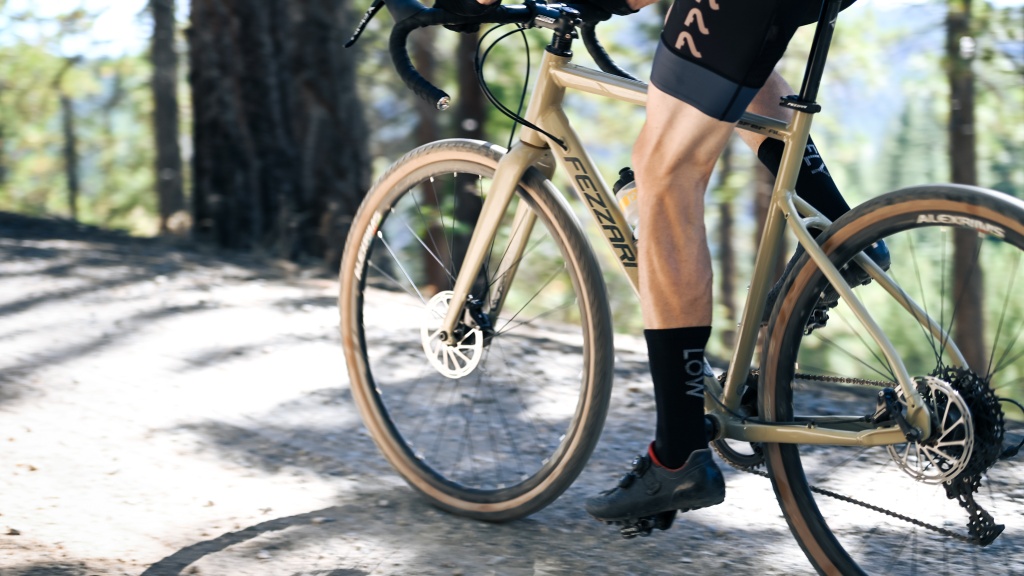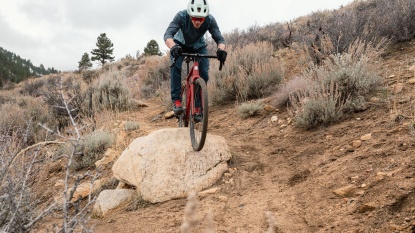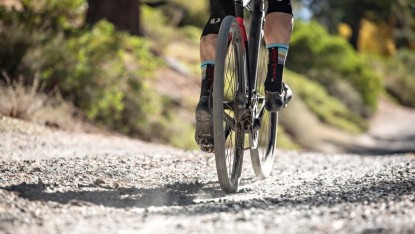Fezzari Shafer AL Review
Our Verdict
Our Analysis and Test Results
Frame Design
The AL in the name Shafer AL stands for aluminum, and unsurprisingly, this bike is built around an aluminum frame paired with a Gravel Carbon Disc Fork. Fezzari also makes the Shafer frame in carbon fiber, but due to long wait times resulting from supply chain issues, we opted to purchase the affordable AL model for testing. The frame has a classic look with nice clean lines and internal cable routing through the front triangle and fork with flat mounts for disc brake calipers. There are two bottle cage mounts within the front triangle along with one on the underside of the downtube, as well as mount points for front and rear fenders and a rear rack. The fork has standard 100mm spacing and uses a 12mm thru-axle while the rear uses a 10 x 135mm quick-release axle (carbon frames have thru-axles front and rear). The fork on the AL frame does not have additional accessory mounts, although the forks on the carbon frames do. Both the frame and fork have claimed clearance for tires up to 40mm wide (carbon frames have clearance for tires up to 50mm wide).
The Shafer AL has a fairly moderate geometry while the carbon frames are somewhat more progressive with a slacker head tube, longer reach, and longer wheelbase. Since we tested the aluminum version, that's what we'll focus on here, and if you're interested in the carbon models, we'd suggest checking out Fezzari's geometry charts for yourself. The AL frame's dimensions suit its entry-level position in the lineup quite well, giving it an approachable and comfortable geometry that's quite easy to get along with and lends itself to a versatile and well-rounded performance. Large and XL frames have a 71-degree head tube angle (S and M frames are 70-degrees) with a 74-degree effective seat tube angle. Our size large test bike had a 550mm top tube length and a somewhat compact 386mm reach. Chainstays are 435mm long across all sizes with a 292mm bottom bracket height and a 1,045mm wheelbase on our large. The Shafer AL comes in 4 frames sizes, S-XL, while the carbon models come in 5 sizes, XS-XL. Our test bike tipped the scales at 21 pounds and 11 ounces set up tubeless and without pedals.
Design Highlights
- Available in aluminum (tested) and carbon frames
- Carbon models have a longer wheelbase and reach and a slacker head tube angle
- Tire clearance up to 40mm (50mm on carbon frames)
- Internal cable routing
- Compatible with dropper seatposts
- Compatible with gravel-specific suspension forks
- Threaded bottom bracket
- Sold as a carbon frame only for $1,699
- Available in five carbon builds with prices ranging from $2,299 up to $4,199
Downhill Performance
The Shafer AL performs admirably on the descents with intuitive handling and a fairly easy-going demeanor. Its moderate geometry is comfortable and easy to get along with, striking a happy middle ground between aggressive/racy and too relaxed. The frame and fork are stiff and responsive, and the component specification comes together nicely. Our only real complaint is that it can feel a bit harsh over rough surfaces, but that's not too surprising given that it's a rigid framed gravel bike.
Like most gravel bikes, the geometry of the Shafer AL is on the relatively conservative side of the spectrum. Interestingly, the carbon version of the bike has a completely different geometry that is a fair amount slacker, longer, and lower. As the least expensive model in the line, we assume that Fezzari intends the AL to be the entry point for many riders with an easy-going geometry that works well in most situations and is easy to get along with. We found that to be the case, as this is a bike you can hop on for your first ride and feel right at home. Its handling is intuitive, sharp, and responsive and the rider position is relatively casual. Depending on your preferences, however, the shorter reach, 386mm on our size large, could feel a bit short, but we feel it will probably work well for most people just dipping their toes in the gravel pool. The bottom bracket also sits a little bit higher than all of the other bikes we've tested, and while it is fine at moderate speeds, we found it feels marginally less stable at higher speeds than other models.
With rigid-framed bikes like the Shafer AL, downhill performance varies pretty significantly depending on the surfaces you ride. Given the nature of the stiff aluminum frame and carbon fork, there's not a lot of forgiveness, and consequently, this bike performs best on smoother gravel roads, pavement, and the mellowest dirt singletracks. The 40mm wide tires have a decent amount of air volume to help dampen some high-frequency vibration and the flared handlebar provides a comfortable and stable front end with responsive handling. Over rough, chunky gravel or washboard, however, we found it to feel a bit harsh, and controlling speed and choosing the smoothest lines became very important. While this is the case with all rigid bikes, the Shafer felt a little more nervous in these situations than some of the other bikes we've tested. Again, on smooth surfaces, this bike felt quick and precise, but there is quite a bit of rough gravel throughout our Lake Tahoe area test area that really highlighted this aspect of its downhill performance.
As the entry-level model in Fezzari's Shafer line, the AL comes with a budget-conscious component specification that helps to keep the price down. Despite the lack of component bling, everything works pretty well on the descents. As mentioned above, the cockpit setup is relatively comfortable and the wide flared handlebar is well suited to gravel riding. SRAM's Apex hydraulic disc brakes provide the speed control, and honestly, we don't notice much of a performance difference compared to the Rival brakes that are a step up in price. The 40mm wide Maxxis Receptor tires are a versatile choice that are fast-rolling and work great on smooth gravel and paved roads but don't provide much cornering, braking, or climbing traction in looser conditions.
Climbing Performance
With a stiff frame and respectable weight, the Shafer AL is a swift and capable climber. With a fairly conservative geometry, it doesn't necessarily feel like a race bike, but it scampers uphill efficiently and effectively regardless. Despite its budget price point, the components work well and don't hold you back.
We've mentioned it a few times already, but the Shafer AL's somewhat conservative geometry gives it a slightly more relaxed seated pedaling position than some of the racier and more aggressive bikes we've tested. The shorter reach, 386mm on our size large, in particular, results in a more upright upper body that avoids feeling too stretched out. The 74-degree effective seat tube angle lines the rider up nicely above the bottom bracket, and power transfer down into the pedals feels very direct and efficient. The aluminum frame is plenty stiff, with no noticeable loss of power through frame flex. Whether grinding it out in the saddle or hammering out of the saddle, it feels like all of your effort is being transferred into forward momentum. At 21 pounds and 11 ounces, the Shafer AL is respectably lightweight for an affordable aluminum-framed bike, and it certainly doesn't feel portly or sluggish that way some heavier bikes can. In fact, it has a snap and liveliness to it that we weren't really expecting.
This rigid-framed bike feels most at home on smooth surfaces. Choppy roads and rough gravel can feel a bit jarring and the rider tends to get bounced around as you might expect. On the climbs, this can result in a loss of traction and we found our rear wheel to be prone to spinning out a little bit on chunky or bumpy sections. The Maxxis Receptor tires work well enough in most situations, but their relatively smooth center tread doesn't offer the best climbing bite in loose dirt and gavel. Beyond that, we found the 1 x 11-speed SRAM Apex drivetrain to provide crisp shifts and adequate range for all the climbs we encountered during testing. The handlebar offers plenty of hand positions and we found the hoods to be comfortable as well. Selle Italia's Model X saddle also surprised us with its comfort, although the cover material felt a little grabby on our riding shorts.
Versatility
The Shafer AL is a fairly versatile bike that could work well for a number of applications. This affordable bike is a perfect entry point into the wide world of gravel riding that's best suited to smooth surfaces. It can be a little harsh over the rough stuff, but can definitely be ridden just about anywhere with a little care. While it doesn't really seem like it's intended to be a race bike, there's no reason you couldn't use it to dip your toes into the race into the race scene or simply participate in various gravel events as well.
Given the relaxed geometry of the Shafer AL, it strikes us as a good option for longer tours. While it doesn't have the wealth of frame mounts as the carbon versions of the bike, one could easily mount up a variety of frame, handlebar, or seat bags for bike packing missions of any length. Additionally, it has mount points for a rear rack for even more carrying capacity. Both the frame and fork have mount points for fenders, so one could easily add those for riding in varying weather conditions. It also strikes us as a solid option for commuting, with the ability to tackle mixed surfaces without batting an eye.
Like any gravel bike, the Shafer AL can also handle duties on the tarmac. With a stiff frame and reasonable weight, we found it to perform well enough on the pavement for more casual road rides.
Weight
With a measured weight of 21 pounds and 11 ounces, the Shafer AL is respectably lightweight given the fact that it has an aluminum frame and a budget-friendly build. As the least expensive, entry-level option in Fezzari's line of Shafer models, it doesn't really come as a surprise that it weighs a tiny bit more than higher-end carbon models that cost significantly more. Compared to the other aluminum framed models we've tested, however, the Shafer AL is the lightest by a couple of pounds. We doubt that most weight-conscious riders and racers will be looking into the base model of the Shafer anyway, but those just getting into gravel or getting a utilitarian bike for mixed surface riding should definitely not be turned off by that weight in the slightest.
Build
The Shafer AL is the least expensive model in Fezzari's Shafer lineup and the only option that comes with an aluminum frame. As the entry-level model, it comes with a budget-friendly but perfectly functional build that performs well when the rubber meets the dirt. While it's far from flashy, the details are well sorted and there's really nothing that needs to be replaced or upgraded to get out and start adventuring. Of course, Fezzari also makes the Shafer in carbon fiber with five additional builds to choose from.
Groupset
The Shafer AL comes equipped with a full SRAM Apex groupset. While it is on the lower end of SRAM's line of components, the Apex group provides all the same features and nearly the same performance as its more expensive siblings. The simple 1 x 11-speed drivetrain consists of SRAM Apex cranks, shifters, derailleur, and an 11-42T cassette that's paired with a 40T front chainring. We found this setup to be very quiet, provide crisp shifting, and offer plenty of range for most situations, although not quite as much as some 2-by options. SRAM Apex hydraulic disc brakes handle the stopping duties, and we found them to work just fine for the duration of our test period.
Wheels/Tires
The Shafer AL rolls on a set of Alex GD24 700c wheels with Maxxis Receptor EXO 40mm tires front and rear. It comes with tubes installed, but both the wheels and tires are tubeless-ready, and converting them to tubeless is an affordable upgrade that we'd highly recommend. That said, our tubeless conversion didn't go as smoothly as planned, as both rims need to be re-taped for them to hold air. Regardless, the Maxxis Receptor tires have a decent amount of air volume, a smooth and fast-rolling center tread, and some small knobs on the shoulders to add a little cornering traction on firm dirt surfaces. We found these tires to perform best on pavement and smooth, firm gravel roads.
Cockpit
The cockpit consists of a number of house-branded components including an alloy stem and handlebar. The handlebar has an 18-degree flare that we found to be quite comfortable and provides a little extra stability when your hands are in the drops. The handlebar is wrapped in Fezzari cushion bar tape, and although it is quite thin, we found it to be comfy and adequately grippy. At the back of the bike, a surprisingly comfortable Selle Italia Model X Superflow saddle sits atop a Fezzari Racing Design Xrt Carbon seatpost.
Build Options
As mentioned previously, the Shafer AL is the only aluminum option in the Shafer lineup and it only comes in the build we tested. There are, however, five carbon-framed builds available, and Fezzari also sells the Shafer as a carbon frame only if you want to put together a custom ride. The carbon options start with the Shafer GRX Comp at $2,299 and top out with the Shafer Pro for $4,199 (as of August 2022). Given Fezarri's consumer direct sales model, all of the Shafer builds are quite reasonably priced compared to most of the mainstream competition.
Suggested Upgrades
While the build of the Shafer AL is perfectly functional, there are a couple of upgrades that we would make to enhance rider comfort and confidence. First, we would be inclined to replace the relatively thin bar tape with something a bit thicker and more cushioned. Second, and this will depend on the terrain and conditions where you ride, we would switch to some tires with a more aggressive tread design. The Maxxis Receptor tires are fine and work well on pavement and smooth, firm gravel roads, but for loose conditions, we would prefer something a little knobbier to increase pedaling, cornering, and braking traction. Unfortunately, the model we tested has claimed clearance for up to 40mm tires, although the carbon frames can accommodate tires up to 50mm in width. The quick-release seatpost clamp is also somewhat curious given that most people don't adjust their saddle height that regularly, so we'd probably swap that out for a lighter and simpler collar.
Should I Buy The Fezzari Shafer AL?
The Shafer AL is a quality gravel bike with an approachable price that we feel is a great option for those just getting started in the gravel scene. This aluminum-framed model has a preference for smoother surfaces with a somewhat conservative geometry that works best for more casual riding styles. While budget-oriented, the component specification is perfectly functional whether you're heading out on the local backroads, tackling a weeklong bike packing trip, or jumping into your first gravel event. Fezzari also makes the Shafer in carbon with slightly different geometry in a range of builds at reasonable prices.
What Other Gravel Bikes Should I Consider?
If you're looking for a bike that can handle rough gravel without breaking the bank, the Canyon Grizl 7 Suspension is worth checking out. With a gravel-specific suspension fork and high-volume tires, the Grizl handles rough surfaces better than most. It comes with a great build and is offered at a very competitive price. It's a bit heavier than the Shafer, but it also comes in lighter-weight carbon frames and a range of different build options. Interested in something higher-performance that can work as everything from a race bike to a bike packing rig? The Santa Cruz Stigmata Carbon CC Apex is a lightweight carbon-framed model with a very well-rounded performance and a high level of versatility. It'll cost you quite a bit more, but we feel it's one of the best all-around gravel bikes on the market.


















